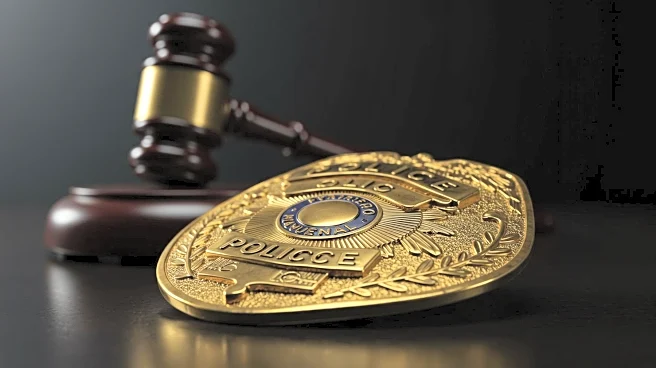What's Happening?
Attorney General Pam Bondi has appointed Terry Cole, the head of the Drug Enforcement Administration (DEA), as Washington's 'emergency police commissioner.' This move is part of President Trump's decision to take control of the Washington police department. Bondi has granted Cole the powers of police chief, requiring the Metropolitan Police Department to obtain his approval before issuing any orders. This appointment follows Cole's recent confirmation by the U.S. Senate as the DEA's leader. Cole has a long history in law enforcement, including 22 years at the DEA, where he worked in various locations such as Oklahoma, New York, and Washington, and spent time overseas combating drug cartels and transnational criminal organizations. The capital city's attorney general has challenged Bondi's action as 'unlawful,' potentially leading to a legal battle.
Why It's Important?
The appointment of Terry Cole as Washington's emergency police commissioner is significant as it represents a direct intervention by the federal government in local law enforcement. This unprecedented move could have implications for the autonomy of local police departments and the balance of power between federal and local authorities. The legal challenge from the capital city's attorney general highlights potential conflicts over jurisdiction and the legality of such federal interventions. This situation may affect public policy regarding immigration enforcement, as Bondi has rescinded policies limiting inquiries into immigration status and preventing arrests based solely on federal immigration warrants. The outcome of this legal dispute could set a precedent for future federal involvement in local policing matters.
What's Next?
The legal dispute over the appointment of Terry Cole as Washington's emergency police commissioner is likely to escalate, with potential court challenges from the capital city's attorney general. The resolution of this conflict will be closely watched by political leaders, law enforcement agencies, and civil society groups, as it may influence future federal interventions in local policing. Additionally, Cole's directives regarding immigration enforcement could lead to changes in how local police departments interact with federal immigration agencies, impacting communities and individuals subject to these policies. Stakeholders will be monitoring the situation to assess its implications for public safety and civil rights.
Beyond the Headlines
The appointment of Terry Cole and the subsequent legal dispute raise broader questions about the role of federal authority in local governance. This situation may prompt discussions on the ethical and legal dimensions of federal intervention in local law enforcement, particularly concerning immigration policies. The potential shift in power dynamics could influence long-term strategies for managing public safety and community relations. Additionally, the controversy may affect public trust in law enforcement and government institutions, as stakeholders evaluate the implications of federal control over local policing.










